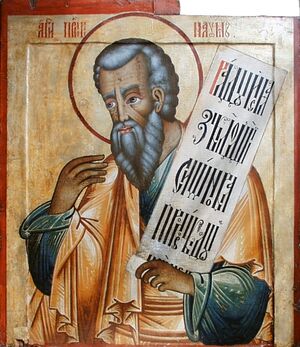Book of Nahum
The Book of Nahum is the seventh book of the Twelve Minor Prophets, containing the prophecy of the Holy Prophet Nahum regarding the destruction of the city of Nineveh. The prophet preached the coming destruction of the city in approximately 660 B.C.
The book contains three chapters of prophecy directed at the city for their return to sinfulness after the successful preaching of the Prophet Jonah, which had previously brought the Ninevites to repentance. The Prophet Nahum rebukes Nineveh: "O city of blood, wholly false, full of unrighteousness..." (Nahum 3:1, Brenton LXX).
Interpretation
Bishop Augustinos (Kantiotes) of Florina draws a comparison to the repentant state of the Ninevites at the time of Jonah and their current state during the prophetic ministry of Nahum. Under the preaching of the prophet Jonah, the city had "sincerely repented" but in the days of Nahum were "wallowing in the mud of their various passions, sins, and crimes."[1]
Bishop Augustinos primarily directs his interpretation of the prophecy's opening: "God is jealous, and the Lord avenges; the Lord avenges with wrath; the Lord takes vengeance on his adversaries, and he cuts off his enemies. The Lord is long-suffering, and his power is great, and the Lord will not hold any guiltless: his way is in destruction and in the whirlwind, and the clouds are the dust of his feet." (Nahum 1:2-3, Brenton LXX) God is identified as "jealous" and "avenging", but ultimately "forbearing" of man's sins. This contrast of two seemingly contradictory attributes of God ultimately reveals of God's mercy, as he not only delivered the Ninevites from their prophesied destruction by Jonah through their repentance but ultimately executed justice when His commands were departed from by the city and they chose not to heed the call to repentance of the prophet Nahum. Nahum describes God's "frightening granduer", as Bishop Augustinos describes it, and even the mightiest and wealthiest cities are humbled by God when they depart from His commandments.
| Old Testament Prophets series |
|---|
Sources
- Holy Apostles Convent. (2002). The Holy Prophet Naum. In The Great Synaxaristes of the Orthodox Church (pp. 1-10).
- ↑ Kantiotes, A. N. (2001). The Book of Nahum. In A Panoramic View of Holy Scripture (pp. 215–220). Institute for Byzantine and Modern Greek Studies. pp. 215-216.
